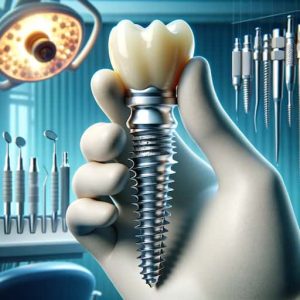Article At A Glance
- The average cost for a single dental implant in Manchester can range from £900 to £3,000.
- Initial consultations usually cost around £100 to £180, with some clinics offering free consultations.
- Additional procedures like bone grafts or sinus lifts can add £300 to £2,000 to the total cost.
- Choosing a skilled and experienced implant dentist is crucial for a successful outcome.
- Many clinics offer financing options to help manage the cost of dental implants.

The True Cost of Dental Implants in Manchester
When you’re considering dental implants, it’s not just about filling a gap in your smile—it’s about restoring your confidence and the functionality of your teeth. But let’s talk brass tacks: cost is a major factor for anyone looking to invest in dental implants. In Manchester, the price tag can vary widely, and it’s important to understand why and how these costs add up.
Initial Consultation Fees
Before you get to the exciting part—flashing your new smile—there’s the initial consultation. This is where your journey begins. You’ll sit down with a dental professional who will assess the health of your gums and jawbone, determine the best course of action, and discuss the costs involved. Typically, you’re looking at around £100 to £180 for this initial meeting. However, some clinics may offer a free consultation, so it pays to shop around.
Price Range for Standard Implant Procedures
Now, onto the main event: the implant itself. A single dental implant in Manchester can set you back anywhere from £900 to £3,000. This range is influenced by various factors, including the type of implant and the complexity of your case. It’s not a one-size-fits-all situation, and your dentist will provide a tailored quote based on your individual needs.
Additional Costs: Bone Grafting and Sinus Lifts
Sometimes, there’s more to the story than just placing an implant. If you’ve experienced bone loss, a bone graft may be necessary to create a solid foundation for the implant. This can add an additional £300 to £750 to your bill. And if the bone near your sinuses needs to be augmented, a sinus lift might be on the cards, potentially adding £2,000 or more to the total cost.
Long-Term Investment: Durability and Success Rates
 It’s important to remember that dental implants are a long-term investment in your oral health. They’re designed to last for decades, and the success rate is impressively high—often above 95%. When you factor in their durability and the potential cost savings over time, compared to other restorative options that might need to be replaced more frequently, implants can be a financially savvy choice.
It’s important to remember that dental implants are a long-term investment in your oral health. They’re designed to last for decades, and the success rate is impressively high—often above 95%. When you factor in their durability and the potential cost savings over time, compared to other restorative options that might need to be replaced more frequently, implants can be a financially savvy choice.
With all this in mind, let’s dive deeper into the nuances of dental implant pricing in Manchester and help you navigate the path to a confident, healthy smile.
Materials and Technology Used
When it comes to dental implants, the materials and technology used are key to ensuring that you get the most bang for your buck. High-quality titanium is the material of choice for most implants due to its strength and compatibility with the human body. The latest advances in 3D imaging and computer-aided design/manufacturing (CAD/CAM) also play a pivotal role in the success of the procedure. These technologies allow for precise planning and placement of the implant, which is crucial for a successful outcome.
Clinician Experience and Expertise
It’s not just about the tools, though. The hands that wield them are just as important. The expertise of your clinician can make a huge difference, not only in the success of the procedure but also in the longevity of your implants. A seasoned dentist with a track record of successful implant procedures is likely to charge more, but the investment in their expertise can pay off in the long run. A good implant dentist will ensure that the procedure is done right the first time, minimizing the risk of complications or the need for revisions.
- Look for a dentist with a strong track record in implant dentistry.
- Check their qualifications and any specialized training they’ve undertaken.
- Consider the dentist’s experience with the specific type of implants you’re getting.
Remember, choosing a dentist for your implants is not a decision to be taken lightly. You’re not just buying a product; you’re investing in a skilled professional’s ability to improve your oral health and quality of life.
Facility Accreditation and Patient Reviews
Don’t forget to factor in the facility itself. Accreditation from reputable organizations ensures that the clinic meets strict standards for patient care and safety. But let’s keep it real: patient reviews can give you the inside scoop. Look for testimonials from previous patients to get a feel for their experiences. This can provide you with valuable insights into the level of care and service you can expect.
Financial Assistance and Payment Plans Available
While the upfront cost of dental implants can be daunting, many clinics in Manchester offer financial assistance or payment plans to help make the cost more manageable. This can include options like 0% finance over a set period, which allows you to spread the cost without paying extra in interest.
It’s worth discussing these options with your dentist during the initial consultation. They can walk you through the available plans and help you find one that suits your budget. Remember, investing in dental implants is a long-term decision that can significantly improve your quality of life, so it’s worth exploring all financial avenues.
Typically, a dental clinic might offer a payment plan that allows you to pay for your implants over 12 months with no interest. This can make a £3,000 procedure feel more like a monthly phone bill rather than a large lump sum.
Insurance Coverage for Dental Implants
Let’s talk about insurance. While dental implants are often considered cosmetic, some insurance plans do offer coverage for them, especially if the procedure is deemed medically necessary. It’s important to check the specifics of your policy to see what’s covered and what’s not.
If your insurance does cover implants, they may only cover a portion of the cost, so you’ll still need to be prepared for some out-of-pocket expenses. If you’re unsure, give your insurance provider a call and ask them to explain the extent of your coverage.
Dental Financing Options
Aside from insurance, there are also dental financing options available. Companies like CareCredit offer healthcare credit cards specifically for medical and dental expenses, allowing you to pay off your treatment over time. Be sure to read the fine print, though, as interest rates and terms can vary.
Some dental practices may also partner with finance companies to offer tailored financing plans for their patients. This can be a convenient way to handle the cost, as everything is managed directly through your dental provider.
Government and Non-profit Subsidies
For those who might find the cost of dental implants prohibitive, it’s worth looking into subsidies or grants from government and non-profit organizations. These can sometimes be available to help cover the costs of dental care for those in need. Eligibility criteria can be strict, and funds are often limited, but for those who qualify, this can be an invaluable resource.
Exploring Low-Cost Dental Implant Alternatives
 If the cost of traditional dental implants is still out of reach, don’t lose hope. There are alternatives that can provide similar benefits at a lower cost. Let’s explore a few options.
If the cost of traditional dental implants is still out of reach, don’t lose hope. There are alternatives that can provide similar benefits at a lower cost. Let’s explore a few options.
Mini dental implants, for example, are smaller and less invasive than traditional implants, which can make them more affordable. They can be a good option for stabilizing dentures or for patients who aren’t candidates for conventional implants due to insufficient bone density.
Dental bridges and dentures are other cost-effective solutions that can restore the appearance and function of missing teeth. While they may not offer the same permanence or bone-stimulating benefits as implants, they can still provide a significant improvement in quality of life.
- Mini Dental Implants: Less invasive and more affordable.
- Dental Bridges: A fixed alternative that can replace one or more missing teeth.
- Dentures: Removable appliances that can replace several or all of your teeth.
Each of these options has its own set of pros and cons, and your dentist can help you decide which is best for your situation. The most important thing is to find a solution that allows you to eat, speak, and smile with confidence.
Mini Dental Implants
Mini dental implants are exactly what they sound like—miniature versions of traditional implants. They’re often used to secure lower jaw dentures and can be a more affordable option for many patients. Because they’re smaller, the procedure to place them is less invasive, and thus, the healing time is typically shorter.
However, mini implants aren’t suitable for everyone. They’re best for situations where bone density is an issue, or the space for an implant is limited. It’s essential to have a thorough consultation with your dentist to determine if mini implants are an appropriate solution for you.
Dental Bridges and Dentures are traditional alternatives to dental implants. Bridges can be a great choice when adjacent teeth need crowns or are already missing. They literally bridge the gap where your teeth used to be. Dentures have come a long way in recent years and can be quite comfortable. They’re a viable option for people missing several or all of their teeth, and they’re usually more affordable than implants.
Foreign Dental Tours: Pros and Cons
Some people consider traveling abroad for dental implants to save money. This is known as ‘dental tourism.’ While the upfront costs may be lower, it’s essential to consider the risks. There may be language barriers, different standards of practice, and if complications arise once you’re home, your local dentist may not be able to provide follow-up care. Always weigh the pros and cons carefully before deciding on dental tourism.
Dental Implant FAQ
Let’s address some of the most common questions about dental implants to help you feel more informed and confident in your decision-making process.
Who Qualifies for Dental Implants?
Most people who are in good general health and have enough bone in their jaw to support an implant can qualify. It’s crucial to have healthy gums and be committed to maintaining good oral hygiene. Your dentist will evaluate your individual situation to determine if implants are the right choice for you.
How Long Do Dental Implants Last?
Dental implants are designed to be a long-lasting solution and can last many years, even a lifetime, with proper care. Their longevity is affected by factors such as oral hygiene, lifestyle choices, and the skill of the dental professional who placed them.
What Is the Timeframe for Completing an Implant Procedure?
The entire process, from the initial consultation to the final placement of the crown, can take several months. This allows for proper healing and ensures the implant is securely integrated into the jawbone. Some procedures can be completed faster with newer techniques, but your dentist will advise you on the best timeline for your specific case.
Are Dental Implants Painful?
Thanks to modern techniques and anaesthesia, most patients report that getting an implant is less painful than they anticipated. Post-procedure discomfort can usually be managed with over-the-counter pain medication.
How Do I Care for My Dental Implants?
Caring for dental implants is similar to caring for your natural teeth. Regular brushing, flossing, and dental check-ups are essential. Your dentist may also recommend specific products or techniques to help maintain your implants.
When it comes to dental implants in Manchester, there’s a lot to consider. The costs can vary, but it’s essential to look beyond the price tag and understand the value of what you’re getting. A successful implant can improve your quality of life significantly. Always choose a qualified dentist, understand the associated costs and procedures, and explore all financial options available to you. With the right care and maintenance, your new smile can last a lifetime.
Disclaimer: The information provided in this article is intended solely for educational purposes and should not be considered as professional dental advice. We strongly recommend consulting with your dentist or a qualified dental healthcare provider before making any changes to your dental care routine or seeking new treatments. The content on this site is not a substitute for professional dental consultations and should not be used to diagnose or treat dental conditions.
This site has been developed by West Pro Media Services. LinkedIn
